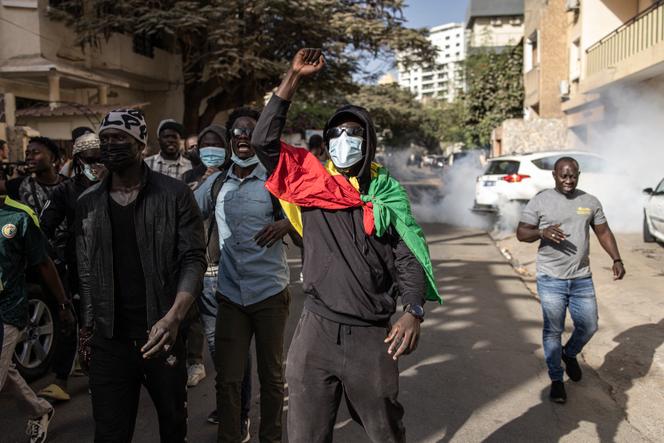


Tensions are running high in Senegal after Macky Sall decided on Saturday, February 3, to postpone the presidential election originally scheduled for February 25. The National Assembly has since set the election for December 15. If the Constitutional Council and the Supreme Court uphold the date after it considers appeals by several candidates, the head of state, who has reaffirmed his commitment not to stand for re-election, would see his term of office extended by more than nine months. On Wednesday, February 7, the opposition called for the creation of a united coalition to defeat him.
The Community of West African States (ECOWAS), which said it was following the situation "with concern," had the previous day encouraged "the political class to take steps urgently to restore the electoral calendar" and called on "the law enforcement agencies to exercise utmost restraint and protect the fundamental rights of all citizens." The US, an important Senegalese ally, questioned the "National Assembly vote that cannot be considered legitimate given the conditions under which it took place." Paris, for its part, called on "the authorities to remove the uncertainties regarding the electoral timetable so that the election can be held as soon as possible and in compliance with the rules of Senegalese democracy."
El Hadji Omar Diop, a lecturer and researcher at Dakar's Cheikh-Anta-Diop University (UCAD) law faculty, explained this institutional crisis, which has seen Senegal enter "the era of constitutional abnormality."
The president of the National Assembly is responsible for policing the assembly. If one or more MPs disrupt the session, he can call them to order and, if the disturbance persists, he can call in the police and have them expelled. On the other hand, in terms of the spirit of democracy, what happened was inelegant, to say the least. Democracy has suffered a serious blow. A law of this importance requires debate and disagreement.
Normally, only the Constitutional Council has the power to suspend the electoral process, and then only in very specific cases such as the incapacity or death of a candidate. The National Assembly can pass laws amending the constitution, but without affecting the number or duration of presidential terms. The adoption of a "bill for the derogation of the provisions of article 31 of the constitution," because it has the direct consequence of extending Macky Sall's term of office, is therefore a clear violation of the fundamental law. And violation of the legal framework of a republic is the basis of all the abuses seen in developing countries experimenting with democracy.
I don't think so. The current situation is the result of a difference of opinion too slight to justify blocking the electoral process since all the country's institutions are operating normally. So this is purely a political strategy, with an institutional crisis that was artificially created after the camp of one of the candidates [Karim Wade] accused two judges of corruption because their candidate was disqualified. The law is being used for political ends.
Knowing that no police or judicial investigation has been carried out and that no clear evidence has been produced, these two judges have been publicly thrown to the wolves. The serious thing is that this presumption of guilt is being used as a tool to undermine the electoral process. By discrediting these judges, the whole institution is undermined – the very institution that must ensure a fair election and proclaim the results. Strategy is taking precedence over law, and that's extremely dangerous. Where will it end?
The council rules with seven judges, but the minimum quorum is four, so there's nothing to prevent the institution from doing its job.
The Senegal constitution is very clear in article 92 paragraph 4: "The decisions of the Constitutional Council are not subject to appeal. They are binding on the public authorities and on all administrative and jurisdictional authorities." Parliament therefore has no prerogative to investigate the decisions of the Constitutional Council or any other jurisdiction.
Clearly, the crux of the problem lies in the validation of patronages. These powers should be entrusted to the Autonomous National Electoral Commission [CENA]. As a control and supervisory body, CENA can receive and verify all patronages. In this way, any disputes can be settled before the constitutional judge, whose role will be protected and his credibility restored.
The head of state may decide to step down the day after April 2. In this case, the National Assembly president would assume power and call a new election within two to three months. Otherwise, his term of office is de facto extended.
If the Constitutional Council approves the appeal against the postponement of the presidential poll, the original electoral process with the February 25 date must resume. Otherwise, a new election date will have to be set. But there is a very real risk that the council will declare itself incompetent, as the bill passed by parliament amends the constitution. In this case, the electoral process will continue, but with a postponement.
This situation would strengthen Macky Sall's position. In a democracy, respect for the republican calendar is a sacrosanct principle. The normal term of office allows the legitimacy of political officeholders to be renewed. Limiting their number and duration is one of the conditions that differentiate democracy from other forms of political regime. If you touch this pillar, the whole edifice is weakened. We have entered the era of constitutional abnormality. This goes to the heart of Senegal's democratic model.
Translation of an original article published in French on lemonde.fr; the publisher may only be liable for the French version.
